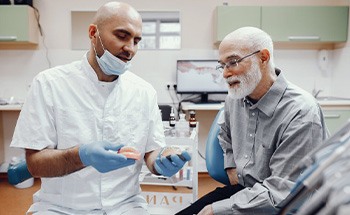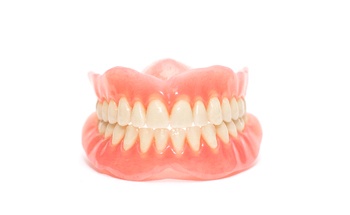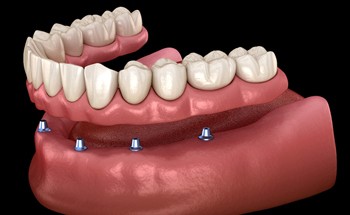Full and Partial Dentures – San Antonio, TX
No More Gaps in Your Smile
 If you’ve been living with missing teeth, then you’re already
aware of how disrupting it can be to your life. Not only have you been forced
to make adjustments in what foods you consume, but your confidence has likely
taken a hit as well. Thankfully, whether you’re missing an entire set or
just a few teeth, there is a solution for you: a custom set of full or partial
dentures. The road to regaining a functional and attractive smile starts by
contacting our San Antonio office today to
request a visit
with either Dr. Troy Jones or Dr. George Knight!
If you’ve been living with missing teeth, then you’re already
aware of how disrupting it can be to your life. Not only have you been forced
to make adjustments in what foods you consume, but your confidence has likely
taken a hit as well. Thankfully, whether you’re missing an entire set or
just a few teeth, there is a solution for you: a custom set of full or partial
dentures. The road to regaining a functional and attractive smile starts by
contacting our San Antonio office today to
request a visit
with either Dr. Troy Jones or Dr. George Knight!
Who’s a Good Candidate for Dentures?

Dentures can restore smiles and improve function for patients missing multiple teeth—or even all of them! If you're struggling with your self-esteem or daily activities like chewing or speaking, dentures might be an excellent solution. These incredible prosthetics can help improve oral health, preserve facial structure, and boost confidence.
At Jones & Knight DDS, we help patients explore every option for relief. Whether you’re missing a few teeth or need full arch support, scheduling a consultation with our team should be your first step. If you’re unsure about dentures, continue reading below to find out whom dentures can help and whether you might be a good candidate.
Effects of Missing Teeth

Missing teeth can impact your health and lifestyle in surprising ways. Here are some common effects:
- Bone Loss: When a tooth is missing, the surrounding bone tissue can gradually shrink, which may alter your facial structure over time.
- Difficulty Chewing and Speaking: Missing teeth can make it hard to eat certain foods, which may lead to nutritional deficiencies. Speech can also be affected, especially if you've lost multiple teeth.
- Shifting Teeth: Neighboring teeth often shift into gaps left by missing ones, which can cause misalignment, bite issues, and discomfort.
- Digestion Issues: Without the ability to chew your food well, larger chunks may begin passing through your digestive system, causing dysfunction and irritation.
- Lowered Confidence: A gap in your smile can affect how you feel in social and professional situations, making you less likely to engage.
If you're experiencing any of these effects, dentures can provide relief!
What Are the Qualities of a Great Candidate for Dentures?

Not everyone is an ideal candidate for dentures, but there are certain qualities that can make some patients more suited than others, such as:
- Multiple Missing Teeth: Dentures are often recommended for patients who are missing several or all their teeth in an arch.
- Healthy Gums: Dentures sit on your gums, so it’s important that they’re healthy and disease-free.
- Sufficient Jawbone Structure: Your jawbone will help stabilize your prosthetics. This means that a healthy bone structure is very beneficial.
- Motivation to Maintain Dentures: Beyond physical aspects, Dr. Jones and Dr. Knight will also assess your overall enthusiasm for your treatment. They want to ensure you’re committed to maintaining your dentures and oral health.
If you believe one or more of these traits apply to you, dentures could be an ideal option for revitalizing your smile! However, a consultation is the only way to be sure. This appointment will help confirm your candidacy and provide the necessary information to create your prosthetics.
Alternative Tooth-Replacement Options

Dentures aren’t the only choice for replacing missing teeth. If, for whatever reason, you don’t think dentures are for you, there are some alternatives:
- Dental Implants: Implants replace individual teeth with durable titanium posts that anchor into the jawbone. They’re known for stability and can last a lifetime with proper care.
- Dental Bridges: Great for patients missing only a few teeth, bridges attach to neighboring teeth to fill gaps, offering a fixed prosthetic that doesn’t require removal for maintenance.
- Implant Dentures: Combining dentures with implants, this option provides a more secure fit than traditional dentures, reducing slipping and restoring a great deal of your bite force to chew food properly.
What are Full Dentures?

When an entire set of teeth is missing, the remedy is to receive a custom-designed full set of dentures. The removable appliance consists of a pink resin base that mimics the appearance of the natural gum tissue. Resting atop the base are porcelain teeth that are bonded in place.
Porcelain is the material of choice for dentures because of several reasons:
- They match the translucency of the original teeth.
- They are similar in strength to tooth enamel.
- Their color is nearly identical to the natural teeth.
A set of full dentures is held in place by applying dental adhesive to the resin surface and the natural suction that occurs inside the mouth.
What are Partial Dentures?

If you have one or more teeth remaining in the upper or lower jaw, then partial dentures are the answer. Like full dentures in San Antonio, they consist of a set of porcelain teeth that are affixed to a pink resin base. Their purpose is to fill in the gaps where there are teeth missing, usually relying upon metal clasps to hold them in position instead of dental adhesive.
Partial dentures don’t just provide aesthetic benefits, though. They also help to prevent the surrounding teeth from shifting, which can lead to malocclusion (a poor bite) and gum infection.
Who is a Good Candidate?

A set of full or partial dentures can be an excellent solution for patients dealing with the following issues:
- One or more teeth missing
- Chipped or otherwise damaged teeth
- Red or swollen gums
Because each situation is unique, the first step to getting the help you need is to pay us a visit to be examined by either Dr. Jones or Dr. Knight. This will help to eliminate any guessing and ensure that you receive the type of restoration that fits your needs.
The Benefits of Full or Partial Dentures
If you have suffered jawbone loss, then a set of full or partial dentures provides a viable solution. As mentioned earlier, when any number of teeth are missing for a prolonged period of time, the surrounding teeth can begin to move. That’s because they depend on the natural tension provided by the other teeth to maintain their position. With the vacated space filled by a set of full or partial dentures, much of the shifting can be eliminated.
From an aesthetic perspective, with a complete set of teeth, you’ll feel more confident about smiling for photos and meeting new people. If you’re looking for even more unique advantages, then there is another option yet to consider.
The Advantages of Implant-Retained Dentures
While full and partial dentures replace missing teeth above the gum line, an implant-retained denture gets to the heart of the problem: the missing tooth root. Made from titanium, a dental implant is a cylinder-shaped fixture that is attached to the underlying jawbone.
Over time, it fuses with the existing bone to create a level of security that can only be matched by the original tooth root itself. To accommodate a full set of dentures in Stone Oak, a series of implants will be strategically placed, with abutments later added that will allow the porcelain restorations to be securely and permanently attached.
The final result will be a smile that looks, feels and functions like you were born with it. To learn more about all of these processes and to determine which route is best for you, contact us at Jones & Knight DDS to schedule an initial visit.
Dentures FAQs

At Jones & Knight, DDS, we understand that extensive tooth loss can be stressful and emotionally difficult. Our team of dental professionals strives to be as helpful as possible as you consider your tooth replacement options. That is why we have compiled the most common questions we encounter regarding partial and full dentures in San Antonio and have answered them below. Don’t see your specific concern addressed in this FAQ section? Then give us a call! Our friendly team is always happy to discuss dentures and other restorative treatment options or schedule an initial consultation with Dr. Jones or Dr. Knight for you.
Can I Eat All My Favorite Foods with Dentures?
While no two patients are exactly alike, many individuals who wear dentures have to make some slight changes to their diet to avoid damaging their replacement teeth or causing their dentures to shift.
The type of denture you wear will likely influence what foods you can continue to consume with ease. Here is a breakdown of how the most common types of dentures can improve your dental function:
- Partial dentures – Most patients experience 30% or greater restoration of chewing range.
- Full traditional dentures – Most patients experience 20% of their healthy dental function.
- Implant-retained dentures – Most patients experience as much as 70% restoration of natural chewing function.
How Long Do Dentures Last?
Full and partial dentures in San Antonio gradually wear down and stain with age. For this reason, dentures typically need to be replaced every 5 to 7 years. With implant-retained dentures, the implant itself can last for decades – or even the rest of your life – but the denture portion will also need to be replaced every 5 to 15 years. Your mouth also changes as you get older, so even if your dentures do not need to be replaced, they may need to adjusted periodically to ensure a proper fit.
How Often Should I Visit a Dentist if I Wear Dentures?
Even if you have lost some or all of your natural teeth and now wear partial or full dentures, you should still visit a dentist in San Antonio twice a year for a routine checkup.
During biannual visits at our office, Dr. Jones or Dr. Knight will evaluate the fit of your dentures, discuss how to properly care for your dentures at home, as well as thoroughly examine your teeth and gums for signs of serious oral health issues, including oral cancer.
How Do I Clean My Dentures?
Regularly cleaning your dentures can help them stay in excellent condition for as long as possible. We recommend cleaning your dentures after every meal by washing them with lukewarm water. Hold them gently but firmly between your thumb and fingers and clean them using a non-abrasive soap or denture cleaner. When washing your dentures, it is a good idea to hold them above a towel or basin of water so they do not break if you happen to drop them.
Do Dentures Cause Gagging?
For individuals who wear dentures, gagging may occur for several reasons, such as:
- Loose dentures that move around and touch the tongue or parts of the throat
- Oversized dentures that touch the throat more than they should because they are too big
- Natural jawbone shrinkage due to tooth removal
For patients who are wearing dentures for the first time, adjusting to speaking and eating with the dental prosthetic is normal and may last for a few weeks. Using a denture adhesive may help in any of the above cases. If your dentures frequently cause you to gag, contact your dentist in San Antonio to evaluate whether your dentures need to be resized.
